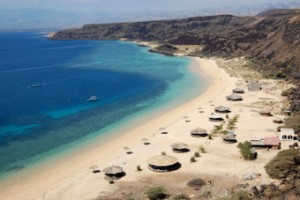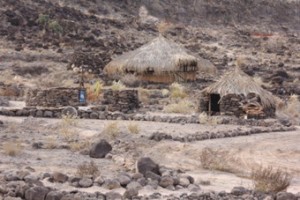By Harbi Abdillahi Omar in Djibouti

Under the programme, which was launched April 2nd, current hotel operators will be able to apply for funds provided by the Djibouti Economic Development Fund (FDED) at advantageous interest rates to expand their businesses and go green, Director General of the National Tourism Office of Djibouti Mohamed Abdillahi Wais told Sabahi.
Funds will be available for operators of traditional hut complexes, which make up the majority of hospitality accommodations available to tourists, to build or rebuild their properties as eco-bungalows using biodegradable materials and solar energy, he said.
In addition to current operators, he said, the money will also be available to young university graduates interested in starting their own tourism-related ventures.
The programme is a quick and effective way of increasing accommodation capacity in areas with high tourism potential, Wais said.
“Only the capital has the infrastructure necessary to accommodate and cater to tourists, but unfortunately it is the regions in the interior of the country that have virtually all of the country’s tourist destinations,” he said, adding that the funding will ensure that ample and adequate accommodations are available for tourists nationwide and bring Djiboutian tourism to a “new era”.
“These eco-bungalows must be sufficiently attractive in terms of aesthetics and comfort while also respecting the local style of architecture so that they will appeal to tourists’ tastes,” he said. “This means that they need to be built using local natural resources, such as brick, stone or straw, depending on the region.”
Tourism can be an effective driving force for poverty reduction and environmental protection as it creates jobs and generates income, the minister said. For this reason, he said, “young people must therefore drive it and we must encourage them to set up their businesses in the tourist services sector”.
“Even at the best of times, revenues derived from informal activities such as tourism in Djibouti only just make it possible for families to meet their immediate needs, essentially food and education, so it gives them no opportunity to invest and offers no prospects for development,” said Mohamed Farah, an economist at the Ministry of Trade and Industry.

Hassan Houmed, 28, who owns a small hut complex in Sable Blanc beach in Tadjourah district, said he applied for a loan to replace his six existing huts with eco-bungalows and to add six more accommodations.
“The financing offered by the Djibouti Economic Development Fund ranges from 5 million to 10 million francs ($28,000 – $56,000) according to needs and is repayable over a period of five to ten years and beyond,” Houmed told Sabahi. “I have applied for a loan of 7 million francs ($39,000), and according to the initial findings of the FDED’s financial advisors, my business with its new eco-bungalows offering bed and board to tourists could turn a [net] profit of nearly 400,000 francs ($2,200) per year.”
Applicants must submit a full business plan and work with FDED architects, he said, adding that he expects to receive the funds and start construction in one month.
Currently Houmed offers the bare minimum to tourists at his facilities — his huts are outdated, have no electricity or toilets, and only provide mats to sleep on.
“Tourists did not queue up to stay there,” he said, adding that he hopes his business will expand and attract more tourists with the improved aesthetics and amenities of the new eco-bungalows.
Jaleelo resident Hawa Elmi also welcomed the government’s initiative, saying it will create jobs and help revitalise local economies.
“A project like this one will significantly reduce poverty in our region because here we [barely] survive,” said the 52-year-old who works as a housekeeper for a local hotel operator. “These eco-bungalows and the massive influx of tourists that will follow will bring jobs for many women like me and provide income generating opportunities to others.”
Source: SabahiOnline


